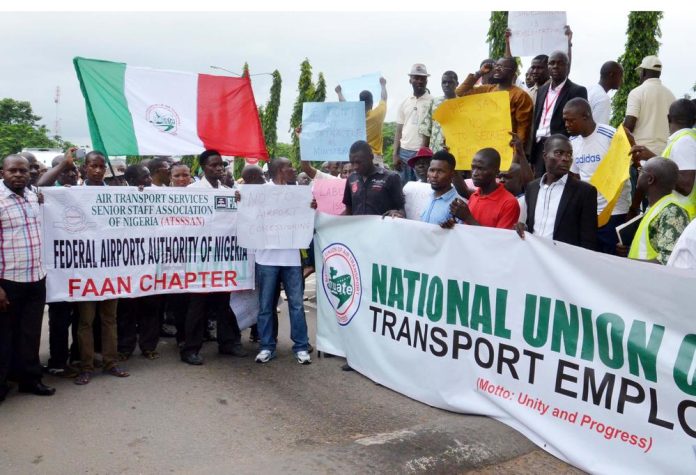Three major aviation unions in Nigeria have threatened to resume a previously suspended industrial action over what they describe as the Nigerian Meteorological Agency’s (NiMet) continued failure to honour the terms of a collective bargaining agreement signed earlier this year.
In a strongly worded letter jointly signed by the National Union of Air Transport Employees (NUATE), the Association of Nigeria Aviation Professionals (ANAP), and the Amalgamated Union of Public Corporations, Civil Service Technical and Recreational Services Employees (AUPCTRE), the unions accused NiMet management of reneging on its promises and squandering the goodwill shown by workers who had earlier suspended a planned strike in hopes of a peaceful resolution.
Central to the dispute is NiMet’s alleged failure to negotiate and implement a new allowance by the end of February 2025, a key term in the agreement reached on January 28. Over six weeks later, the unions say there has been no effort to initiate discussions on the allowance, nor has any explanation been provided by the agency’s leadership.
Beyond the delayed allowance, the unions highlighted several unresolved issues including the 25–35 per cent wage increase, the 40 per cent peculiar allowance, and the outstanding nine-month balance of the 2019 minimum wage arrears. They also raised concern about the exclusion of 30 eligible employees from the payment list for the 2019 wage implementation and the lack of transparency surrounding the negotiated conditions of service document, which has reportedly been forwarded to the ministry but withheld from union signatories.
The unions expressed deep suspicion over what they described as “foul play” regarding the withheld documentation. Despite multiple requests, the management has allegedly refused to release copies of the agreement to the union representatives, raising further concerns about the agency’s intentions.
They also criticised the agency’s inaction on the critical issue of salary relativity—a concern backed by the Minister of Aviation, Festus Keyamo—and expressed frustration over the agency’s shift in focus from staff training for higher-grade levels (GL10–14) to scheduling another management retreat, even after holding two similar events within the past year.
“This continued disregard for the agreed terms is both troubling and worrisome,” the unions stated. “It is a matter of serious regret that management has squandered the goodwill shown by our unions after we averted a previous crisis by suspending our industrial action. These fragrant infractions on a duly signed collective bargaining agreement are unacceptable.”
The unions have now issued a deadline of Wednesday, April 16, 2025, for the full implementation of all pending components of the agreement. Failure to comply, they warned, will result in the immediate resumption of the suspended strike action without further notice. All union branches and state councils have been directed to commence full mobilisation of their members across the country.
Workers at NiMet have echoed the unions’ grievances, highlighting the severe financial strain they have endured. One employee, speaking anonymously, confirmed that while the 25–35 per cent wage increase has been approved, it has yet to be paid. “I think we might receive it in April or May, but until now, there’s been nothing,” the staffer said.
Another worker decried the hardships faced since the 2019 minimum wage was introduced, noting that NiMet staff initially received only 10 per cent of the revised wage. Although partial arrears covering 34 out of 43 owed months were eventually paid in August 2024, the remaining nine months are still outstanding. “That pain is real. Some of us are yet to be paid, while others were,” the staff member lamented.
Workers also revealed that they have not received the N40,000 peculiar allowance announced for all civil servants, nor have they seen implementation of the newly approved minimum wage. “We’ve seen the template and documents, but nothing has changed. They claim we’re not captured in the budget despite the approval, and we believe that’s just another excuse to delay,” one worker said.
Describing the dire financial situation, another employee explained, “90 per cent of NiMet staff are on loans. Many can’t afford transport to work. Our children go to school like everyone else’s, we pay rent, we live in the same economy, and yet we’re treated like this. We are civil servants working for national development—why are we suffering?”
In January, the unions had issued a 14-day ultimatum demanding that NiMet address longstanding welfare concerns, threatening nationwide industrial action if the issues remained unresolved. The unions’ earlier call, scheduled for February 4, 2025, was suspended in good faith, but with little progress made since then, workers are once again preparing to withdraw their services.
As April 16 approaches, tensions are rising within the aviation sector. The unions have made it clear: without immediate and full compliance from NiMet, nationwide operations could grind to a halt.













